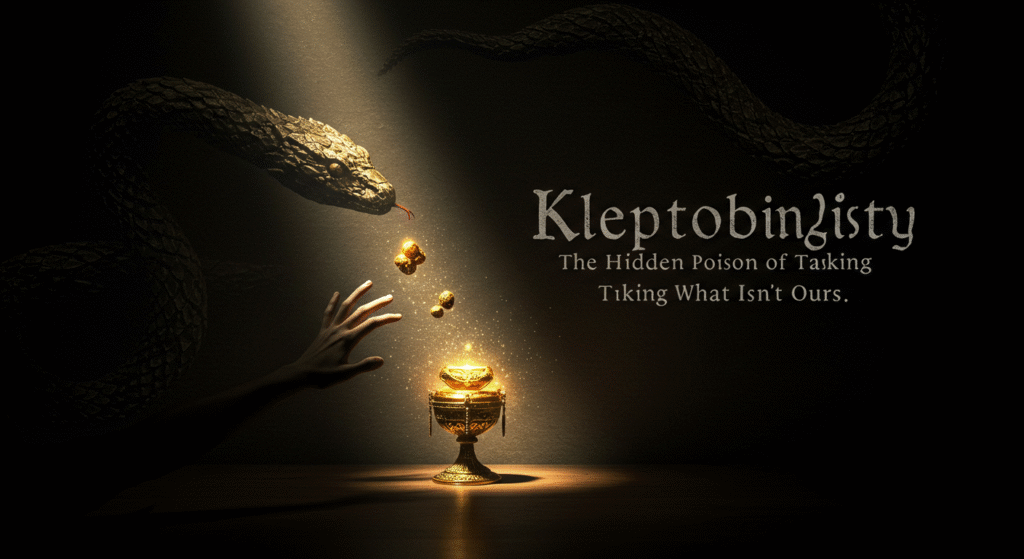We live in a world of acquisition — where value is measured by what we own, control, or consume. Yet beneath this pursuit lies an invisible poison: kleptotoxicity, the toxic consequence of taking what does not belong to us.
Derived from the Greek kleptein (“to steal”) and toxikon (“poison”), kleptotoxicity describes the emotional, moral, and societal decay that arises from habitual or systemic acts of taking — whether it’s stealing material possessions, exploiting others’ labor, or appropriating emotional energy.
Kleptotoxicity is not just a crime of action — it’s a disease of mindset, a corruption of empathy, and a distortion of the human spirit. It affects both the thief and the society that tolerates the theft.
In an age where greed, manipulation, and unethical acquisition dominate global headlines, understanding kleptotoxicity is essential for rebuilding integrity and balance.
The Meaning and Origins of Kleptotoxicity
While “kleptomania” refers to a compulsive urge to steal, kleptotoxicity goes further — it names the spiritual and relational damage that theft inflicts.
It can manifest in multiple ways:
-
Personal kleptotoxicity – when an individual’s acts of taking erode their inner moral and emotional health.
-
Social kleptotoxicity – when entire systems or cultures normalize exploitation or dishonesty.
-
Emotional kleptotoxicity – when people drain others’ energy, affection, or trust for personal gain.
In short, kleptotoxicity is not only about stolen goods — it’s about stolen goodness.
The Psychology of Taking: Why Humans Steal
To understand kleptotoxicity, we must first explore the psychology behind taking.
Humans are not born thieves — they are born seekers. We take because we desire security, power, or validation. When these desires become distorted or excessive, taking becomes a compulsion.
Psychologists identify several motives behind theft and exploitation:
-
Insecurity – taking as a defense against perceived lack or weakness.
-
Narcissism – taking to affirm superiority or control.
-
Addiction – taking becomes a thrill, a rush of power that briefly fills emotional emptiness.
-
Social conditioning – taking as a learned behavior in competitive or corrupt environments.
Kleptotoxicity begins when these acts stop being isolated incidents and become part of one’s identity or system — a slow poisoning of empathy and self-awareness.
Personal Kleptotoxicity: The Self-Poisoning of the Soul
When individuals repeatedly take what isn’t theirs — whether through lies, manipulation, or theft — they experience an internal corrosion.
This is personal kleptotoxicity — the moral toxicity that infects a person’s psyche and relationships.
1. Loss of Empathy
Every act of unethical taking numbs empathy. The more someone exploits or deceives, the easier it becomes.
Eventually, compassion is replaced by calculation — others become tools, not people.
2. Identity Erosion
Thieves often justify their actions as survival, revenge, or entitlement. But over time, this justification reshapes self-image.
The person becomes defined by the act of taking, not by genuine creation or contribution.
3. Emotional Contamination
Like any toxin, kleptotoxicity spreads. Guilt, paranoia, and shame fester beneath the surface. The constant need to defend dishonesty drains mental energy and peace.
The paradox is tragic: in trying to take more, the kleptotoxic person loses themselves — trust, authenticity, and emotional freedom dissolve.
Social Kleptotoxicity: When Systems Steal
Kleptotoxicity doesn’t just operate on an individual level — it infects entire societies.
Social kleptotoxicity occurs when the act of taking is normalized or institutionalized — when injustice is woven into the structure of power.
Examples include:
-
Corporate exploitation, where profits are built on underpaid labor or environmental harm.
-
Political corruption, where leaders steal public wealth and moral trust.
-
Cultural appropriation, where dominant groups take from marginalized cultures without respect or credit.
In such cases, the toxin of taking becomes collective.
It doesn’t just harm the victims — it corrodes the ethical fabric of the whole community.
As history shows, societies collapse not when they are poor, but when they become morally bankrupt — when kleptotoxicity spreads unchecked through governance, economy, and culture.
Emotional Kleptotoxicity: The Invisible Theft of Energy
Not all stealing is material.
In relationships, some people drain others emotionally — consuming time, affection, and attention without reciprocity.
This is emotional kleptotoxicity — a subtle but devastating form of theft.
Signs include:
-
Constantly taking emotional support but offering none in return.
-
Manipulating empathy through guilt or victimhood.
-
Drawing validation by undermining others.
Emotional kleptotoxicity thrives in imbalance. It poisons intimacy, turning love into control and care into exhaustion.
Over time, both parties suffer — the taker becomes dependent on extraction, and the giver becomes depleted, resentful, or numb.
Kleptotoxic Culture: The Age of Taking Without Giving
The modern world is, in many ways, kleptotoxic by design.
Consumerism rewards acquisition. Social media rewards attention-seeking. Politics rewards manipulation.
We take time, data, credit, and even identities — often unconsciously.
The result is a culture built on extraction rather than contribution.
1. Digital Kleptotoxicity
Online, content is copied without credit, ideas are stolen without acknowledgment, and privacy is mined for profit.
The internet has become both a library and a theft factory — where intellectual and personal boundaries blur.
2. Environmental Kleptotoxicity
The planet itself suffers from humanity’s compulsive taking — deforestation, pollution, and overconsumption.
In this sense, kleptotoxicity is not only psychological but ecological — the poisoning of our shared home through unrestrained greed.
3. Spiritual Kleptotoxicity
When society glorifies wealth and power above compassion and humility, it robs people of meaning.
We start believing that value is measured in possession, not purpose.
This theft of soul — this spiritual kleptotoxicity — leaves us materially full but existentially empty.
The Science of Toxicity: How Taking Corrupts the Taker
Though kleptotoxicity is metaphorical, its effects are measurable in the body and brain.
Studies in neuroscience show that unethical behavior activates stress responses similar to exposure to real toxins.
Chronic dishonesty or guilt elevates cortisol, disrupts sleep, and increases anxiety.
Over time, this leads to psychosomatic toxicity — physical manifestations of moral decay.
This is why even successful thieves or manipulators often live with unease, paranoia, or emotional emptiness.
The body knows what the conscience tries to ignore: that toxic gain is still poison.
The Antidote to Kleptotoxicity: Restoring Balance
If kleptotoxicity is the poison of taking, its antidote is generosity — the conscious act of giving, restoring, or repairing.
Healing begins with three steps:
1. Awareness
Recognize where taking has become habitual or justified.
This requires radical honesty — confronting not only theft of things, but of trust, credit, or kindness.
2. Accountability
Repairing damage means acknowledging harm.
True atonement is not apology alone, but restitution — returning what was taken, whether tangible or emotional.
3. Reconnection
Kleptotoxicity isolates; giving reconnects.
Engaging in service, sharing resources, or creating value counteracts the psychological damage caused by exploitation.
Generosity purifies what greed corrodes.
It restores dignity not only to the giver but to the entire ecosystem of relationships.
Case Studies: Modern Forms of Kleptotoxicity
1. Corporate Scandals
When corporations engage in unethical practices — from tax evasion to data mining — they suffer reputational collapse.
This is organizational kleptotoxicity: the internal culture becomes cynical, innovation declines, and trust evaporates.
2. Creative Plagiarism
Artists and writers who plagiarize may achieve short-term recognition, but they lose authenticity — the creative poison of theft eventually erodes credibility.
3. Emotional Manipulation in Leadership
Leaders who take loyalty or attention without reciprocating integrity infect their teams with fear and apathy — a classic case of social kleptotoxicity.
In each instance, the pattern is the same: the act of taking produces decay.
Kleptotoxicity in Philosophy: The Moral Weight of Taking
Philosophers across history have warned against the dangers of unjust taking.
-
Aristotle saw theft as a disruption of virtue and social harmony.
-
Kant viewed it as a violation of moral autonomy — using others as means, not ends.
-
Marx interpreted systemic theft (exploitation) as the root of alienation.
Kleptotoxicity unites these perspectives — framing theft not just as moral error, but as a toxin that corrupts the human condition.
It reminds us that integrity is not a law but a lifeline: once severed, all relationships — personal, economic, ecological — begin to wither.
The Future: Detoxing Society from the Culture of Taking
To heal from kleptotoxicity, society must shift from extraction to reciprocity — from “How much can I take?” to “What can I give or sustain?”
This transformation involves:
-
Ethical economies, prioritizing transparency and fairness.
-
Conscious consumption, reducing environmental theft.
-
Relational ethics, practicing empathy and consent.
-
Education, teaching the value of contribution over possession.
The goal is not to abolish ambition or ownership, but to balance them with conscience.
Only then can progress become sustainable and human.
Conclusion
Kleptotoxicity is a mirror — one that reflects the quiet corruption within our personal desires and social systems.
It shows that every act of taking without giving carries a cost — not just to the victim, but to the soul of the taker.
To live ethically is to recognize this law of balance: what we take must be matched by what we give.
Only by detoxing our minds, relationships, and institutions from kleptotoxic habits can we restore harmony and trust in a fractured world.
In the end, the cure for kleptotoxicity is not punishment — it’s participation.
Not shame, but shared responsibility.
And not silence, but the courageous act of giving back what was never ours to keep.







